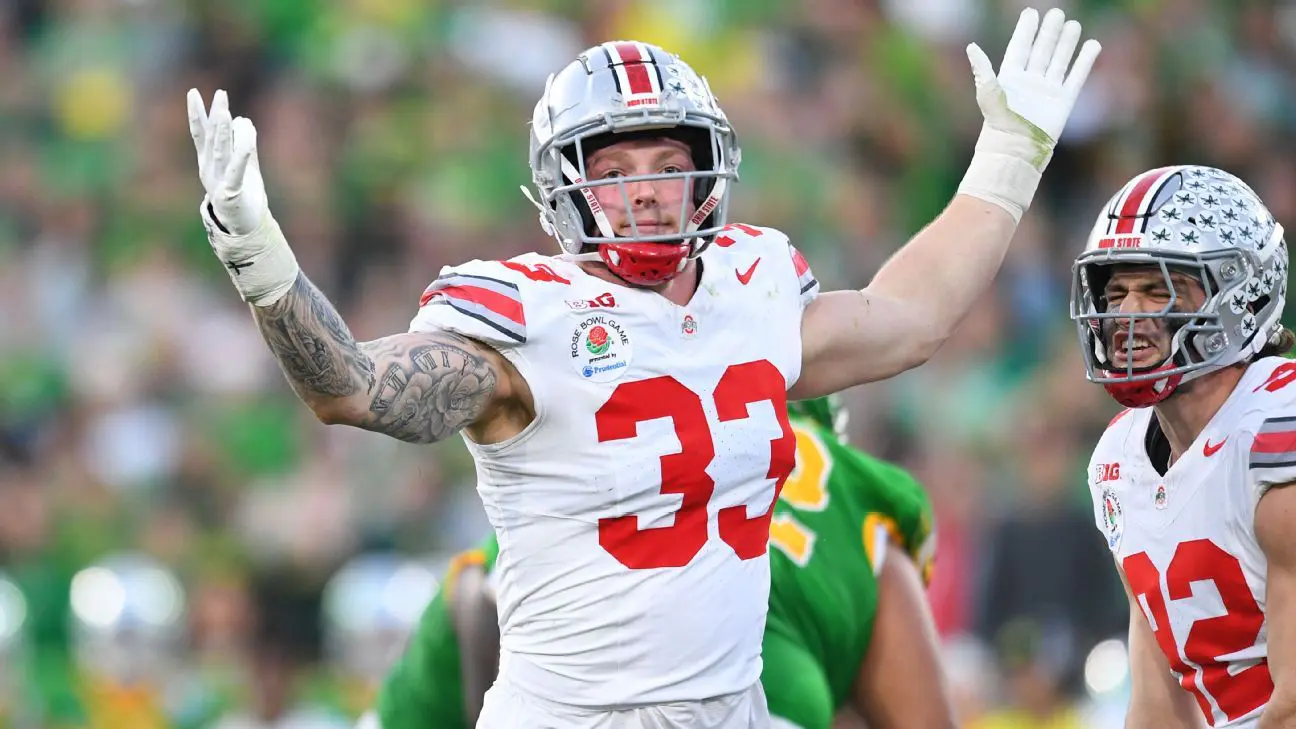Canadian Prime Minister Justin Trudeau has announced his resignation. What happens now?
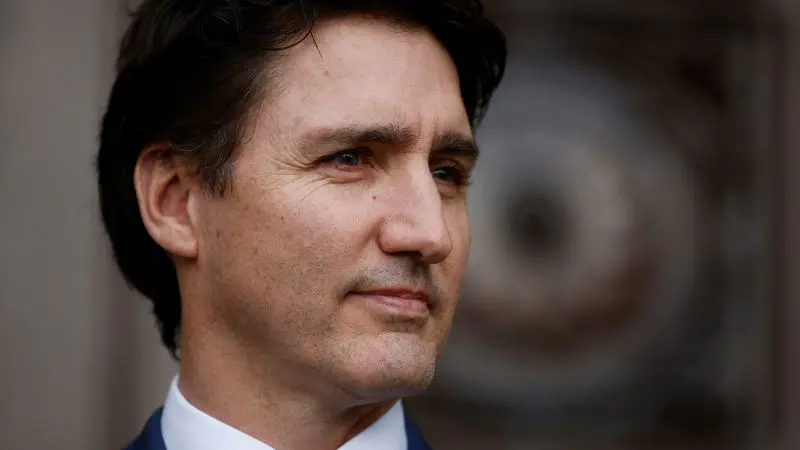
Prime Minister Justin Trudeau announced his resignation on Monday, saying he intends to step down from the top job and as the leader of Canada’s ruling Liberal Party once a new party leader is chosen.
“I intend to resign as party leader, as prime minister, after the party selects its new leader,” the 53-year-old leader told reporters at a news conference in Ottawa on Monday.
Canada’s parliament will be suspended until March 24 while a new Liberal Party leader is chosen, he also said.
Trudeau added that he has “one regret” – failing to reform Canada’s election process, ahead of a general election expected this fall.
“If I have one regret, particularly as we approach this election — well, probably many regrets that I will think of,” the outgoing leader said. “But I do wish we’d been able to change the way we elect our governments in this country so that people could simply choose a second choice, or a third choice on the same ballot.”
Trudeau, leader of the Liberal Party for 11 years and prime minister for nine, was facing a mounting set of crises, from Donald Trump’s tariff threats to the resignation of key allies and disastrous opinion polls. His resignation couldbe seen as choosing to jump before he is pushed, ahead of a general election to be held later this year that he is widely expected to lose.
Trudeau took the Liberals to power in 2015, promising “sunny ways” for Canada. He championed progressive issues like combating climate change and addressing historic abuses against Indigenous peoples, but the latter years of his premiership have been marked by rising economic discontent.
A viral confrontation with a steel worker, who criticized Trudeau for not addressing the high cost of living, captured the growing discontent among Canadians.
“You’re not really doing anything for us, Justin,” the worker remarked, highlighting a sentiment that resonated widely.
Trudeau’s government was also rocked last year by the surprise resignation of Deputy Prime Minister and Finance Minister Chrystia Freeland, just hours before she was due to deliver her annual fiscal update.
In a blistering letter of resignation, she criticized Trudeau’s “political gimmicks,” likely referring to a two-month sales tax holiday and 250 Canadian dollar ($175) rebates for most workers.
Freeland said Canada could “ill afford” these policies, seen as a pre-election handout to claw back some voters, and coming as the country faces the serious prospect of huge tariffs which could be levied by the incoming Trump administration.
US President-elect Donald Trump, set to return to the White House on January 20, has said he will sign an executive order imposing a 25% tariff on all products coming into the US from Canada. Trump has also taken to belittling Trudeau and the country of Canada on social media, referring to the prime minister as the “governor” of the “Great State of Canada.”
The Liberal Party national executive, which controls leadership issues, is scheduled to meet this week, likely after the caucus. Suspending parliament is designed to give the party time to choose a new leader.
Possible replacements include the former governor of both the Bank of England and Bank of Canada Mark Carney, foreign minister Mélanie Joly, and former deputy prime minister Chrystia Freeland.
The hope is that a new party leader could bring the Liberals out of their funk, before a general election set to be held on or before October 20. Current polls show Trudeau’s Liberal Party behind the opposition Conservative Party, led by the firebrand Pierre Poilievre.
“This country deserves a real choice in the next election and it has become clear to me that if I’m having to fight internal battles, I cannot be the best option in that election,” said Trudeau on Monday.
Trudeau was elected three times, most recently in 2021, when he remained in power but lost his governing majority. Since then, Poilievre’s Conservative Party has built a lead over the Liberal Party of more than 20% in national polling averages.
Trudeau told reporters on Monday that Poilievre’s conservative vision “is not the right one for Canadians.”
“Stopping the fight against climate change doesn’t make sense. Backing off on the values and strength and diversity that Canada has always, always, worked to pull itself together on is not the right path for the country. Attacking journalists, the CBC institutions, that’s not what Canadians need in this moment. We need an ambitious, optimistic view of the future – and Pierre Poilievre is not offering that,” he said.
Reacting to Trudeau’s resignation Monday, President-elect Trump doubled down on the idea that Canada and the US should merge.
“Many people in Canada LOVE being the 51st State. The United States can no longer suffer the massive Trade Deficits and Subsidies that Canada needs to stay afloat. Justin Trudeau knew this, and resigned,” he said on Truth Social.
“If Canada merged with the U.S., there would be no Tariffs, taxes would go way down, and they would be TOTALLY SECURE from the threat of the Russian and Chinese Ships that are constantly surrounding them. Together, what a great Nation it would be!!!” he added.
Poilievre, who has already found currency with the MAGA base, bolstering his position as a potential candidate for this year’s general election amid an incoming Trump administration, also seized on Trudeau’s resignation to make an offer to Canadian voters.
“Canadians can take back control of their lives and their country,” Poilievre said in a video post on X. “Take back control of our border. Take back control of immigration. Take back control of spending, deficits and inflation.
“We’ll cap spending, axe taxes, reward work, build homes, uphold family, stop crime, secure borders, rearm our forces, restore our freedom and put Canada first,” he said.
And Freeland, a possible contender to replace Trudeau, who said in December that she and Trudeau had “found ourselves at odds about the best path forward for Canada,” thanked him for his service on Monday.
“I thank Justin Trudeau for his years of service to Canada and Canadians. I wish him and his family the very best,” she wrote on X.
Trudeau said at Monday’s press conference that he had hoped Freeland would continue as his deputy, “but she chose otherwise,” declining to provide more detail on their conversations.
CNN’s Lex Harvey and Sana Noor Haq contributed reporting.
Justin Trudeau says he will resign as Canada's prime minister and Liberal Party leader amid political turmoil
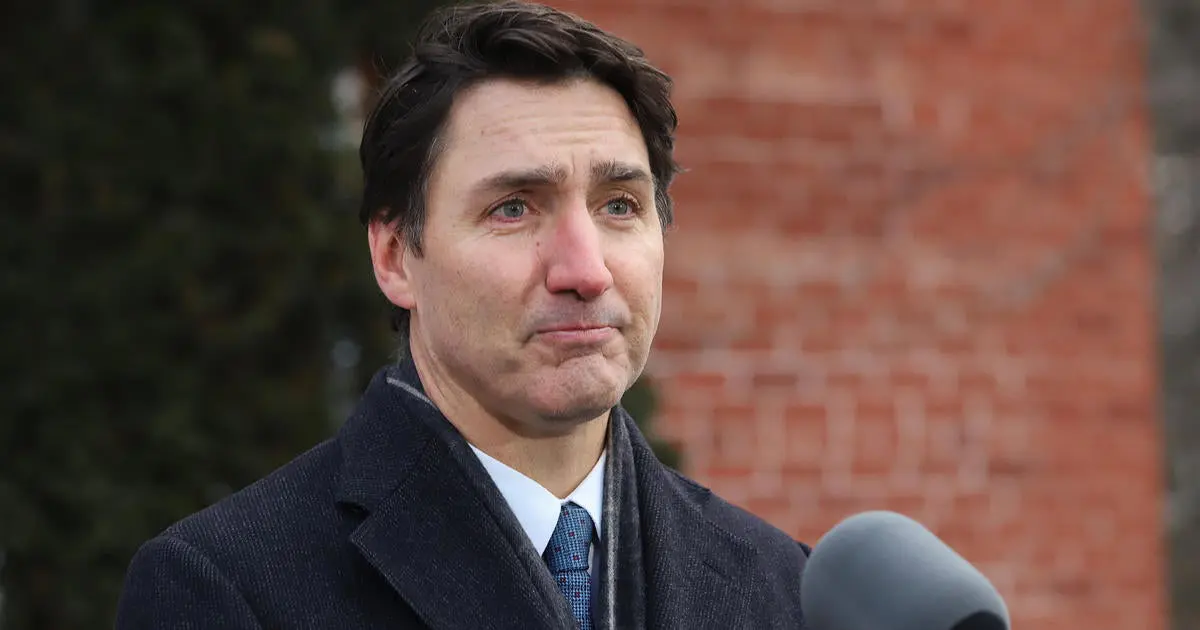
Canadian Prime Minister Justin Trudeau announced on Monday he will resign as prime minister and Liberal Party leader amid growing opposition to his leadership.
"The fact is, despite best efforts to work through it, parliament has been paralyzed for months, after what has been the longest session of a minority parliament in Canadian history," Trudeau said in televised remarks outside of his home in Ottawa, Canada's capital city. "I intend to resign as party leader, as prime minister, after the party selects its next leader through a robust, nationwide competitive process."
Trudeau said Canada's parliament will pause until a new leader has been chosen. It will resume in late March, which will allow for a Liberal Party leadership race.
"This morning, I advised the governor general that we need a new session of parliament," he said. "She has granted this request, and the House will now be prorogued until March 24."
Trudeau, a former high school teacher and son of former Prime Minister Pierre Trudeau, became prime minister in 2015 after his Liberal Party won a decisive parliamentary majority. The Liberal Party won two more successive elections in 2019 and 2021, but lost the popular vote, requiring him to form a minority government with a left-wing opposition party, leaving his party dependent on allies to pass legislation.
In his press conference on Monday Trudeau called for a more unified political environment and suggested changes to Canada's election process that would allow voters to look "for things they have in common instead of polarizing and dividing Canadians against each other." He said failing to amend that process during his term is "one regret particularly" that he has leading up to the next election.
Trudeau's leadership has faced significant challenges in the wake of the COVID crisis, leading to a loss of confidence among Canadians from various backgrounds. Key issues such as housing affordability, the rising cost of living and high levels of immigration contributed to widespread disillusionment. This growing frustration led to Trudeau's own Liberal supporters to start calling for his resignation.
Finance Minister Chrystia Freeland's abrupt resignation on Dec. 16 further complicated Trudeau's political landscape and threw his Liberal Party into disarray, reviving calls for him to step down.
In an explosive resignation letter posted online, Freeland said she and the prime minister had become "at odds about the best path forward for Canada." His housing minister had resigned a week earlier.
Asked to address Freeland's departure, which some saw as the catalyst to Trudeau's resignation announcement, the prime minister said he had hoped Freeland would agree to continue in his cabinet as deputy prime minister, "but she chose otherwise." Trudeau declined to share more details about their "private conversations."
Trudeau made a last-ditch effort to shuffle his cabinet, hoping to add some stability to his government, but that failed as well.
The Toronto Star's editorial board said in an op-ed published Dec. 16 that Trudeau is "seemingly more concerned with his own survival than with the national interest," urging him to walk away "for his legacy, his party and his country."
The Toronto Police Association also said in a post on social media Dec. 17 that it had lost faith in Trudeau's government, saying it's "time to resign and leave these critically important public safety issues to someone else."
Jagmeet Singh, leader of the New Democratic Party and once an ally of Trudeau, threatened to bring down the Liberals' minority government through a non-confidence vote in the next sitting if he didn't resign.
"Justin Trudeau failed in the biggest job a Prime Minister has: to work for people, not the powerful," Singh said in an online statement.
Calls for Trudeau's resignation gained momentum after U.S. President-elect Donald Trump's announcement of a potential blanket 25% tariff on Canada and Mexico if they don't take stronger action against illegal immigration and drug trafficking concerns. Trump has targeted Trudeau and Canada in recent days, with the president-elect appearing to joke about Canada becoming the 51st state with Trudeau as governor.
Some of Trudeau's critics have suggested he is unable to stand against Trump's economic pressure and bullying.
Conservative leader Pierre Poilievre called for an early election, while the Bloc Quebecois, leader, Yves-François Blanchet, warned that it would be "absolutely irresponsible" to remain in such an unstable situation under Trudeau's leadership.
Polls show Trudeau's Liberal Party trailing 20 points behind the Conservatives, with upcoming elections in October.
Donald Trump Says Canada Should Be '51st State' as Prime Minister Justin Trudeau Resigns
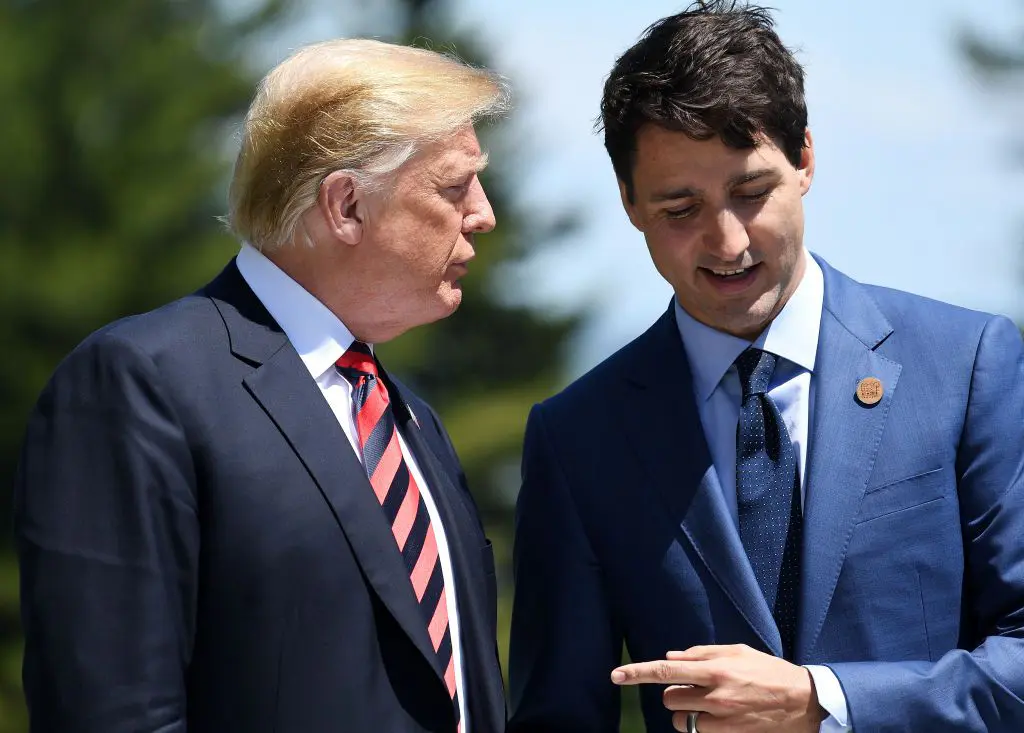
President-elect Donald Trump reacted to Canadian Prime Minister Justin Trudeau's decision to resign on Monday, Jan. 6, suggesting that now would be a good time for Canada to join the United States.
"Many people in Canada LOVE being the 51st State," he wrote sarcastically on Truth Social, referencing his running bit that Canada should not be its own country.
"If Canada merged with the U.S., there would be no Tariffs, taxes would go way down, and they would be TOTALLY SECURE from the threat of the Russian and Chinese Ships that are constantly surrounding them," he continued. "Together, what a great Nation it would be!!!"
In a press conference on Monday morning, Trudeau revealed that he plans to step down as Canada's longtime leader as soon as a successor is chosen — and though Trudeau's political future had looked uncertain for a while, it was Trump's victory in the November presidential election that helped speed up his downfall.
Prior to the U.S. presidential election, Trudeau's popularity with voters was already dipping in part because of economic challenges like inflation and a housing shortage.
When Trump was elected, his threat to impose 25% tariffs on Canadian goods heightened fears in Canada about their economic stability.
Never miss a story — sign up for PEOPLE's free daily newsletter to stay up-to-date on the best of what PEOPLE has to offer.
Trudeau traveled to Mar-a-Lago in November to meet with President-elect Trump and discuss U.S.-Canada relations, but it didn't seem to defuse the threat of tariffs.
Instead, Trump began mocking Trudeau by saying that Canada should become a U.S. state and calling the prime minister its "governor."
Then in December, Trudeau's standing with fellow Liberal Party lawmakers reached an irreparable low when he tried to demote his once-trusted finance minister after she criticized his proposals for more spending, according to Reuters.
His finance minister quit in frustration, writing in her resignation letter that Trudeau was not prepared for the looming tariff war with Trump and that Canada faces a "grave challenge" if the government does not limit spending and build its reserves.
Mounting criticisms of Trudeau's leadership, coupled with dire polling that predicts major losses for the Liberal Party in the upcoming national election, drove the final nail into his premiership.
Canada's Prime Minister Justin Trudeau resigns
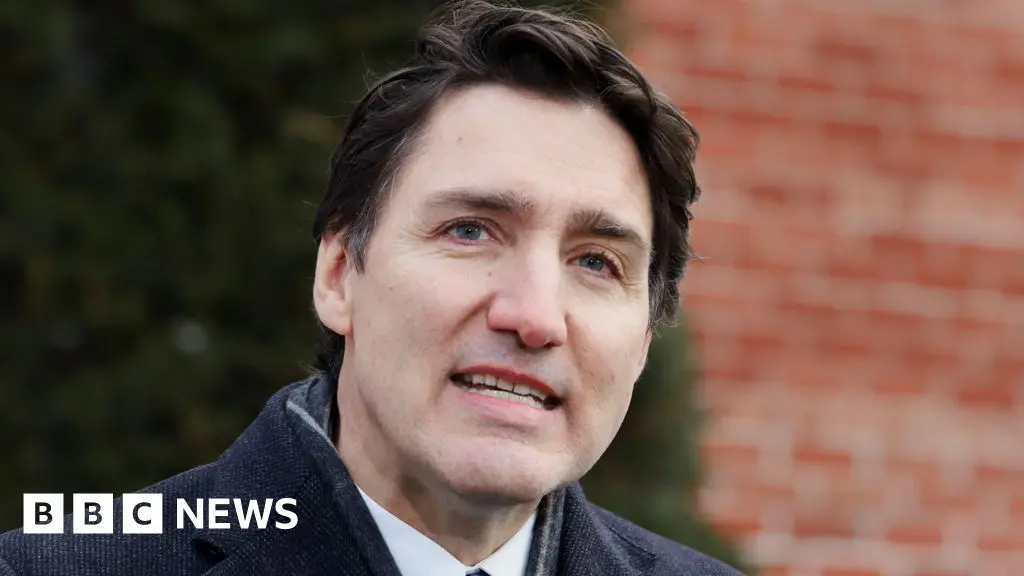
Under growing pressure from his own party, Canadian Prime Minister Justin Trudeau has announced he will step down and end his nine-year stretch as leader.
Trudeau said he would stay on in office until his Liberal Party can choose a new leader, and that parliament would be prorogued - or suspended - until 24 March.
"This country deserves a real choice in the next election and it has become clear to me that if I'm having to fight internal battles, I cannot be the best option in that election," he said during a press conference Monday.
Trudeau's personal unpopularity with Canadians had become an increasing drag on his party's fortunes in advance of federal elections later this year.
"Last night, over dinner, I told my kids about the decision that I'm sharing with you today," he told the news conference in Ottawa.
"I intend to resign as party leader, as prime minister, after the party selects its next leader through a robust nationwide competitive process," he said.
The president of the Liberal Party, Sachit Mehra, said a meeting of the party's board of directors would be held this week to begin the process of selecting a new leader.
Who might replace Trudeau as Liberal Party leader?
Why the Trudeau era has come to an end now
In a statement, he added: "Liberals across the country are immensely grateful to Justin Trudeau for more than a decade of leadership to our Party and the country."
"As Prime Minister, his vision delivered transformational progress for Canadians," he said, citing programmes his government has implemented like the Canada Child Benefit and the establishment of dental care and pharmacare coverage for some medication.
Conservative leader Pierre Poilievre said "nothing has changed" following Trudeau's resignation.
"Every Liberal MP and Leadership contender supported EVERYTHING Trudeau did for 9 years, and now they want to trick voters by swapping in another Liberal face to keep ripping off Canadians for another 4 years, just like Justin," Poilievre wrote on X.
Trudeau, 53, had faced growing calls to quit from inside his Liberal Party, which ramped up in December when deputy prime minister and long-time ally Chrystia Freeland abruptly resigned.
In a public resignation letter, Freeland cited US President-elect Donald Trump's threats of tariffs on Canadian goods, and accused Trudeau of not doing enough to address the "grave challenge" posed by Trump's proposals.
Trump has promised to impose a tax of 25% on imported Canadian goods - which economists have warned would significantly hurt Canada's economy - unless the country takes steps to increase security on its shared border.
Trudeau said Monday that he had hoped Freeland would have continued as deputy prime minister, "but she chose otherwise".
Canada has since announced that it will implement sweeping new security measures along the country's US border in response to the threat.
In an online post, Trump claimed that pressure over tariffs led to Trudeau's resignation and repeated his jibe that Canada should become "the 51st State".
"If Canada merged with the U.S., there would be no Tariffs, taxes would go way down, and they would be TOTALLY SECURE from the threat of the Russian and Chinese Ships that are constantly surrounding them," he wrote.
Since 2019, the Liberal Party has governed as a minority party.
Following Freeland's resignation, Trudeau lost the backing of parties that had previously helped keep the Liberals in power - the left-leaning New Democrats, who had a support agreement with the Liberals, and the Quebec nationalist party, Bloc Quebecois.
The largest opposition party, the Conservatives, have maintained a significant two-digit lead over the Liberals in polls for months - suggesting that if a general election were held today, the Liberals could be in for a significant defeat.
Liberals will now choose a new leader to take the party into the next election, which must be held on or before 20 October.
A senior government official told the BBC that the race is an open contest, and that the Prime Minister's Office will fully stay out of the process, leaving it to Liberal Party members to decide their future.
Speaking to reporters, the Bloc Quebecois leader Yves-François Blanchet suggested that an early election be called once the Liberals choose their new leader.
Trudeau is the son of Canadian Prime Minister Pierre Trudeau, who dominated the country's politics in the 1970s and '80s.
The younger Trudeau became prime minister after the Liberal Party won a sweeping majority in 2015 amid a promise to usher in a new, progressive era of "Sunny Ways".
His record includes a commitment to gender equality in his cabinet, which continues to be 50% women; progress on reconciliation with Indigenous people in Canada; bringing in a national carbon tax; implementing a tax-free child benefit for families; and legalising recreational cannabis.
Assembly of First Nations National Chief Cindy Woodhouse Nepinak praised Trudeau's track record on indigenous issues following his resignation, saying in a statement that he "has taken meaningful steps to address issues that matter to First Nations".
"While much work remains, these actions have laid a foundation for future governments to build upon."
Clouds began to hang over Trudeau's government in recent years, which weathered a series of often self-inflicted scandals, including a controversy over a deal with a Canadian firm facing corruption charges and photos that emerged of the prime minister wearing brownface makeup.
Vaccine mandates and other restrictions were also met with fierce backlash by some Canadians, leading to the Freedom Convoy truck protests in early 2022. Trudeau eventually used unprecedented emergency powers to remove the protesters.
As Canada began to emerge from the pandemic, housing and food prices skyrocketed, and his government pulled back on ambitious immigration targets as public services began to show strain.
By late 2024, Trudeau's approval rating was at its lowest - just 22% of Canadians saying they thought he was doing a good job, according to one polling tracker.
In Ottawa, a small group of protestors danced outside Parliament Hill in celebration of his resignation.
One passer-by, however, said he thinks things were fine under Trudeau's watch.
"I'm a carpenter," Hames Gamarra, who is from British Columbia, told the BBC. "I mind my own business, I get my wages, I pay the bills. It's been OK."
Another Canadian, Marise Cassivi, said it feels like the end of an era. Asked if she feels any hints of sadness, she replied: "No."
"It's the right thing."
What happens next for Canada as Trudeau resigns?
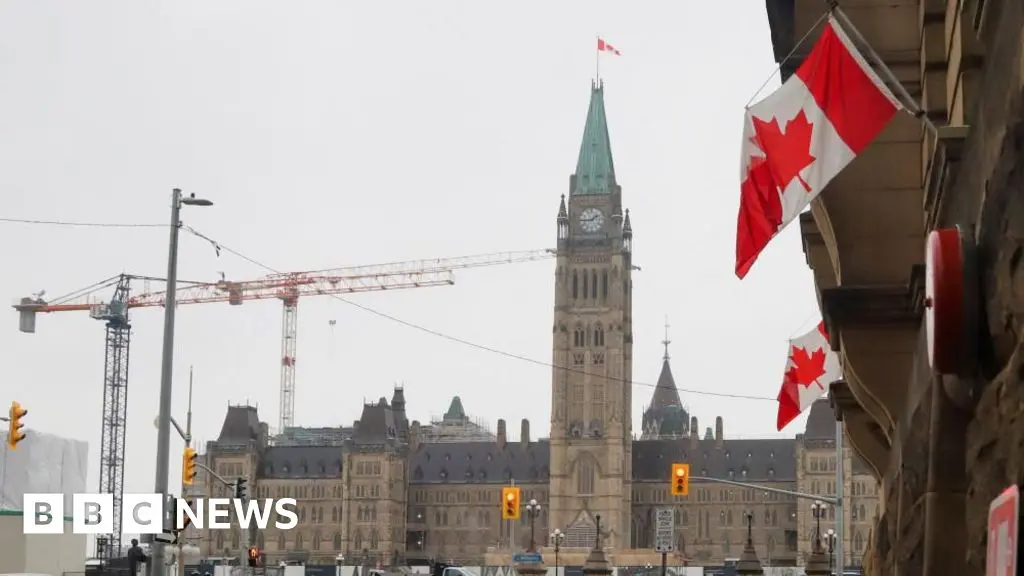
After weeks of mounting pressure to step down, Justin Trudeau has announced he will resign as Canada's prime minister and as leader of the Liberal Party of Canada.
The resignation brings a long political chapter to an end. Trudeau has been in office since 2015, when he brought the Liberals back to power from the political wilderness.
Trudeau said he will remain at the helm until a new Liberal leader is selected.
But many questions remain for the party, including who will take over and how they will manage a looming federal election. So what happens next?
Addressing Canadians on Monday, Trudeau said the country's governor general had accepted his request to prorogue Parliament - essentially a suspension that will stop all proceedings, including debates and votes, without dissolving parliament.
While a routine part of parliamentary procedure, it is sometimes used by governments to buy time during a political crisis.
Parliament was most recently prorogued by Trudeau in August 2020, when his government was facing an ethics scandal over its handling of a contract with a charity.
This latest prorogation will freeze parliament until 24 March.
It is likely the Liberal caucus will try to have a new leader in place by the end of the prorogation period, though it is so far unclear how that leader will be chosen.
Typically, leaders of Canada's federal parties are chosen over a four or five month period, a process that includes a formal leadership convention.
On Monday, Trudeau said a new leader would be chosen through a "robust, nationwide, competitive process".
The president of the Liberal party, Sachit Mehra, said soon afterwards the party would convene a meeting of its national board this week to select a new leader.
There is no clear successor to Trudeau, but several prominent Liberals including former Finance Minister Chrystia Freeland, Transport Minister Anita Anand and formal central banker Mark Carney have been floated as possible leaders.
Canada must have its next federal election by October, but it's likely a vote will be called before that.
Riding high in opinion polls with a double-digit lead, the official opposition Conservative Party have tried for months to trigger an election by bringing a series of no-confidence votes in the House of Commons.
The government needs the backing of a majority of the 338 members of parliament in a no-confidence vote. The Liberals are 17 seats shy of that, meaning they require support from members of Canada's other parties.
So far, members of the left-leaning New Democratic Party (NDP) have supplied Trudeau with enough votes to maintain control.
But on Monday, after Trudeau announced he would step aside, NDP Leader Jagmeet Singh said he would vote to bring down the Liberal Party, no matter who the leader is.
"They do not deserve another chance," he said.
Whoever is in charge of the Liberals by 24 March will not have much time to govern.
And after prorogation ends, the first vote will be a confidence motion. If the government loses that confidence motion, it is expected to resign or seek the dissolution of parliament, triggering a federal election.
Polls indicate that if a Canadian election were to be held today, the official opposition Conservative Party would win decisively.
Pierre Poilievre is the leader of Canada's Conservative Party.
If opinion polls are any indication, he is odds-on favourite to be Canada's next prime minister.
Since taking over his party in 2022, Poilievre has been an especially formidable opponent to the prime minister, frequently calling on Trudeau to bring an early election.
Poilievre has branded himself as anti-elite and anti-Trudeau, a down-to-earth everyman.
He was ejected from Parliament in April after refusing to apologise for calling Trudeau a "wacko" and "extremist" during a question period.
Canadian Prime Minister Justin Trudeau has announced his resignation. What happens now?

Prime Minister Justin Trudeau announced his resignation on Monday, saying he intends to step down from the top job and as the leader of Canada’s ruling Liberal Party once a new party leader is chosen.
“I intend to resign as party leader, as prime minister, after the party selects its new leader,” the 53-year-old leader told reporters at a news conference in Ottawa on Monday.
Canada’s parliament will be suspended until March 24 while a new Liberal Party leader is chosen, he also said.
Trudeau added that he has “one regret” – failing to reform Canada’s election process, ahead of a general election expected this fall.
“If I have one regret, particularly as we approach this election — well, probably many regrets that I will think of,” the outgoing leader said. “But I do wish we’d been able to change the way we elect our governments in this country so that people could simply choose a second choice, or a third choice on the same ballot.”
Trudeau, leader of the Liberal Party for 11 years and prime minister for nine, was facing a mounting set of crises, from Donald Trump’s tariff threats to the resignation of key allies and disastrous opinion polls. His resignation couldbe seen as choosing to jump before he is pushed, ahead of a general election to be held later this year that he is widely expected to lose.
Trudeau took the Liberals to power in 2015, promising “sunny ways” for Canada. He championed progressive issues like combating climate change and addressing historic abuses against Indigenous peoples, but the latter years of his premiership have been marked by rising economic discontent.
A viral confrontation with a steel worker, who criticized Trudeau for not addressing the high cost of living, captured the growing discontent among Canadians.
“You’re not really doing anything for us, Justin,” the worker remarked, highlighting a sentiment that resonated widely.
Trudeau’s government was also rocked last year by the surprise resignation of Deputy Prime Minister and Finance Minister Chrystia Freeland, just hours before she was due to deliver her annual fiscal update.
In a blistering letter of resignation, she criticized Trudeau’s “political gimmicks,” likely referring to a two-month sales tax holiday and 250 Canadian dollar ($175) rebates for most workers.
Freeland said Canada could “ill afford” these policies, seen as a pre-election handout to claw back some voters, and coming as the country faces the serious prospect of huge tariffs which could be levied by the incoming Trump administration.
US President-elect Donald Trump, set to return to the White House on January 20, has said he will sign an executive order imposing a 25% tariff on all products coming into the US from Canada. Trump has also taken to belittling Trudeau and the country of Canada on social media, referring to the prime minister as the “governor” of the “Great State of Canada.”
The Liberal Party national executive, which controls leadership issues, is scheduled to meet this week, likely after the caucus. Suspending parliament is designed to give the party time to choose a new leader.
Possible replacements include the former governor of both the Bank of England and Bank of Canada Mark Carney, foreign minister Mélanie Joly, and former deputy prime minister Chrystia Freeland.
The hope is that a new party leader could bring the Liberals out of their funk, before a general election set to be held on or before October 20. Current polls show Trudeau’s Liberal Party behind the opposition Conservative Party, led by the firebrand Pierre Poilievre.
“This country deserves a real choice in the next election and it has become clear to me that if I’m having to fight internal battles, I cannot be the best option in that election,” said Trudeau on Monday.
Trudeau was elected three times, most recently in 2021, when he remained in power but lost his governing majority. Since then, Poilievre’s Conservative Party has built a lead over the Liberal Party of more than 20% in national polling averages.
Trudeau told reporters on Monday that Poilievre’s conservative vision “is not the right one for Canadians.”
“Stopping the fight against climate change doesn’t make sense. Backing off on the values and strength and diversity that Canada has always, always, worked to pull itself together on is not the right path for the country. Attacking journalists, the CBC institutions, that’s not what Canadians need in this moment. We need an ambitious, optimistic view of the future – and Pierre Poilievre is not offering that,” he said.
Reacting to Trudeau’s resignation Monday, President-elect Trump doubled down on the idea that Canada and the US should merge.
“Many people in Canada LOVE being the 51st State. The United States can no longer suffer the massive Trade Deficits and Subsidies that Canada needs to stay afloat. Justin Trudeau knew this, and resigned,” he said on Truth Social.
“If Canada merged with the U.S., there would be no Tariffs, taxes would go way down, and they would be TOTALLY SECURE from the threat of the Russian and Chinese Ships that are constantly surrounding them. Together, what a great Nation it would be!!!” he added.
Poilievre, who has already found currency with the MAGA base, bolstering his position as a potential candidate for this year’s general election amid an incoming Trump administration, also seized on Trudeau’s resignation to make an offer to Canadian voters.
“Canadians can take back control of their lives and their country,” Poilievre said in a video post on X. “Take back control of our border. Take back control of immigration. Take back control of spending, deficits and inflation.
“We’ll cap spending, axe taxes, reward work, build homes, uphold family, stop crime, secure borders, rearm our forces, restore our freedom and put Canada first,” he said.
And Freeland, a possible contender to replace Trudeau, who said in December that she and Trudeau had “found ourselves at odds about the best path forward for Canada,” thanked him for his service on Monday.
“I thank Justin Trudeau for his years of service to Canada and Canadians. I wish him and his family the very best,” she wrote on X.
Trudeau said at Monday’s press conference that he had hoped Freeland would continue as his deputy, “but she chose otherwise,” declining to provide more detail on their conversations.
CNN’s Lex Harvey and Sana Noor Haq contributed reporting.
Canada’s Prime Minister Justin Trudeau announces decision to step down
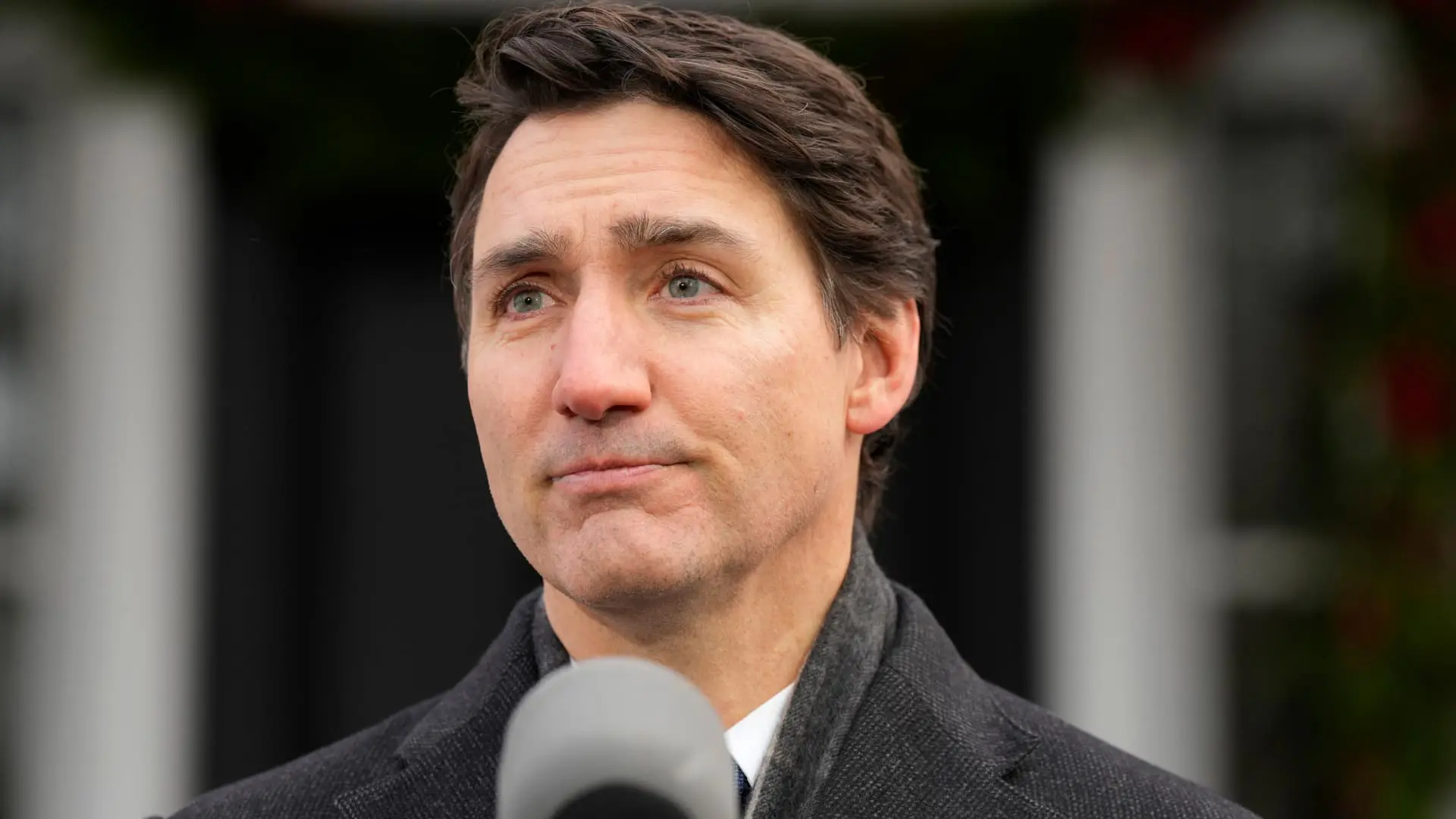
Canada's Justin Trudeau on Monday said he would step down from the helm of the ruling Liberal Party, but will stay on as prime minister until a new leader is selected ahead of general elections due by late October.
"I intend to resign as party leader, as prime minister after the party selects its next leader through a robust nationwide, competitive process," he said during a Monday news conference. "Last night, I asked the president of the Liberal Party to begin that process. This country deserves a real choice in the next election, and it has become clear to me that if I'm having to fight internal battles, I cannot be the best option in that election."
He added that the Canadian Parliament will be prorogued — suspending its activity — until March 24, when a confidence vote will be carried out.
"Parliament has been entirely seized by obstruction and filibustering and a total lack of productivity over the past few months. We are right now the longest serving minority government in history, and it is time for a reset," Trudeau said.
Domestic press had reported he was expected to announce his resignation before a key national caucus meeting on Wednesday. Canadian stocks were slightly higher following the news. The S&P TSX index was up 0.1%, and the Canadian dollar gained 0.5% to 1.4373 against its U.S. counterpart. The iShares MSCI Canada ETF (EWC) climbed 0.5%.
Canada's latest political crisis was triggered by the abrupt departure of former Trudeau ally and Deputy and Finance Minister Chrystia Freeland, who resigned in December, citing differences over Ottawa's response to prospective U.S. trade nationalism over the next four years under President-elect Donald Trump's incoming administration.
Dominic LeBlanc has since been appointed to succeed her and head the finance ministerial portfolio.
Trudeau, 53, who assumed office in 2015 and won reelection twice, suffered a plunge in voter popularity to just 19% in the wake of Freeland's departure, pollster Abacus Data found on Dec. 17. The Angus Reid Institute on Dec. 30 pronounced a "bruising year for federal Liberals" and assessed just 16% of popular support for the party — its weakest level since the institute began tracking in 2014. Trudeau's resignation leaves a successor at most mere months to prepare an electoral campaign.
The opposition Conservative Party now has a more than 20% lead in the polls ahead of general elections — and its firebrand leader, Pierre Poilievre, has gained the compliments of Trump ally Elon Musk, who recently praised his "great interview."
Despite growing calls for his resignation, Trudeau had demurred on taking the step since the middle of December, and the Liberal Party lacks a mechanism to evict its leader nonconsensually.
In a fresh blow to Trudeau, Jagmeet Singh, leader of allied left-wing New Democratic Party, on Dec. 20 announced in an open letter the intention to introduce a motion to topple Trudeau's government, paving the path for an election.
"Justin Trudeau has failed in the most important task beholden to a prime minister: working for the people and not for the powerful," Singh said, according to a CNBC translation. "The liberals of Justin Trudeau have made many beautiful promises. Yet they have let down the people, again and again."
Trudeau has recently presided over a Canadian economy that only just heeled inflation below its 2% target in November, but remains battered by household debt, rising unemployment, the worst productivity performance in the Organization for Economic Cooperation and Development in 2023 and panoptic exposure to the U.S. – where Trump, belittling "governor" Trudeau, has already teased the possibility of both 25% tariffs and annexation.
Differences over Canada's response to Trump's "aggressive economic nationalism" finally splintered Freeland from Trudeau last month.
"We need to take that threat very seriously," she warned in her resignation letter, stressing "the serious challenges presented by the United States" and urging pushback against “'America First' economic nationalism with a determined effort to fight for capital and investment and the jobs they bring."
— CNBC's Fred Imbert contributed to this report.
Canada's embattled PM Justin Trudeau announces he will step down
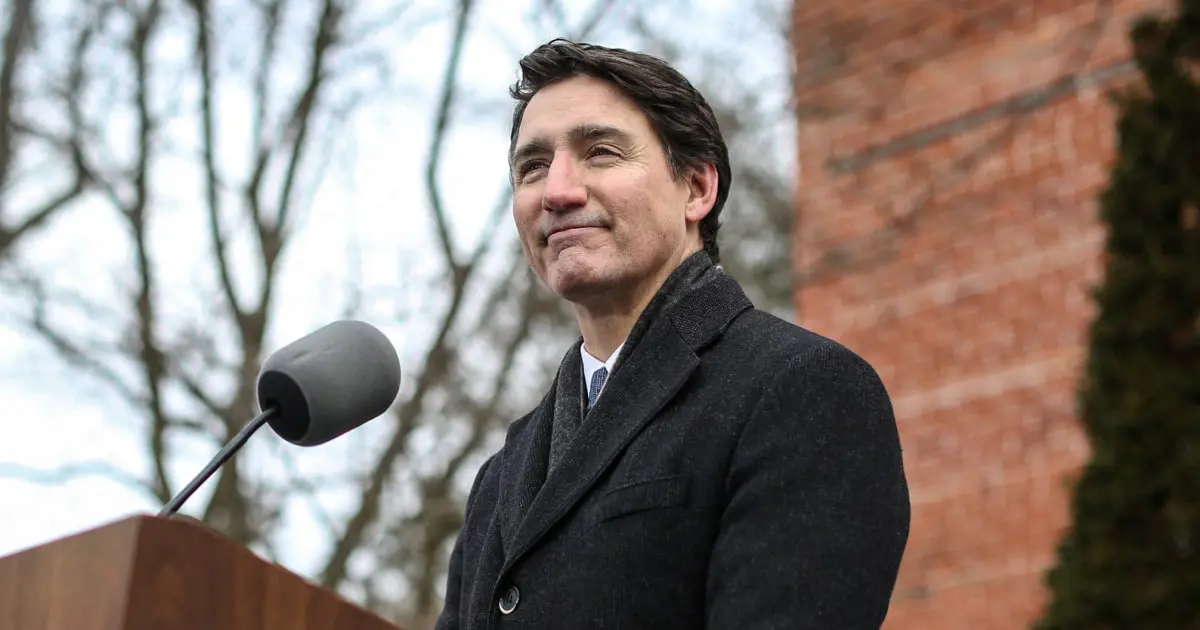
Justin Trudeau said Monday that he will resign as the leader of Canada's ruling Liberal Party, an announcement that will fire the starting gun on a contest to replace him as prime minister.
Trudeau said it was clear that he could not "be the leader during the next elections due to internal battles," later citing polarization inside and outside the country.
"I intend to resign as party leader, as prime minister, after the party selects its next leader through a robust, nationwide competitive process," Trudeau told reporters in Ottawa. "Last night, I asked the president of the Liberal Party to begin that process."
The beleaguered prime minister's departure follows growing calls for his resignation from member of his own party, with the Liberals lagging behind the opposition Conservative Party in opinion polls and internal battles raging over his handling of President-elect Donald Trump.
That pressure rose with the resignation of Deputy Prime Minister Chrystia Freeland last month. Freeland, who was also the finance minister, quit unexpectedly citing concerns over the Trudeau administration's relatively cooperative approach to the incoming Trump administration's plan to increase import tariffs on Canadian goods by 25%.
Front-runners to replace Trudeau include former and current finance ministers Freeland and Dominic LeBlanc, as well as Foreign Affairs Minister Mélanie Joly.
“For the past number of weeks, you and I have found ourselves at odds about the best path forward for Canada,” Freeland said in her resignation letter, adding that the country can “ill afford” Trump's tariff threats.
The longterm Trudeau ally added that leaving the Cabinet was the only “honest and viable path.”
During his remarks Monday, Trudeau called Freeland "an incredible political partner" and said he had hoped she would stay on as deputy prime minister, "but she chose otherwise."
"In regards to what actually happened, I am not someone who's in the habit of sharing private conversations," Trudeau said about Freeland's resignation.
After Trudeau's announcement, Freeland took to X to thank the prime minister for his years of service.
"I wish him and his family the very best," Freeland wrote.
Trudeau, who swept to power in late 2015 and has governed for nine years, was once the most popular leader in the Group of Seven, the world's most advanced liberal economies.
But the party’s popularity has declined rapidly against the opposition over the past year. The latest survey released Friday by the Canadian research firm Angus Reid found that voter support for the Liberals had sunk to an all-time low of 16%.
What was already a difficult year for Trudeau got even harder when Trump said after being re-elected in November that he would sign an executive order imposing tariffs on all products coming to the United States from Mexico and Canada.
“On January 20th, as one of my many first Executive Orders, I will sign all necessary documents to charge Mexico and Canada a 25% Tariff on ALL products coming into the United States, and its ridiculous Open Borders,” he said in a post on Truth Social.
Days later, Trudeau visited the president-elect at his Mar-a-Lago estate in Florida, later writing in a post on X: “Thanks for dinner last night, President Trump. I look forward to the work we can do together, again.”
Trump has since taken jabs at Trudeau and Canada, suggesting making the country America's 51st state and referring to the prime minister as the “governor” of the “Great State of Canada.”
Anticipation about Trudeau’s resignation increased after a report Monday from Canada’s Globe and Mail, which said he would resign in advance of a key national caucus meeting due to take place Wednesday because he had come to the conclusion that he no longer had sufficient political support.
Trudeau's popularity was waning before his recent handling of the prospect of fresh American tariffs. Many working-class and young Canadians blame him for the country's high rate of inflation and long-running political chaos.
Last August, a tense exchange between Trudeau and a disgruntled steel worker in northern Ontario went viral after the worker refused to shake the prime minister’s hand, saying he was struggling to make ends meet despite having a steady job.
“I think you are only here for another year,” the worker said in a clip that went viral on social media.
Trudeau also said that he feels it is time for a government reset in the country, as Parliament "has been entirely seized by obstruction and filibustering and a total lack of productivity over the past few months." He said he hopes that the end of the parliamentary session and him leaving office will ease political polarization.
"It's time for the temperature to come down, for the people to have a fresh start in Parliament, to be able to navigate through these complex times, both domestically and internationally," he said.
Leader of the Conservative Party Pierre Poilievre released a video following Trudeau's announcement enumerating what he said were the failings of the Liberal-controlled government.
"Every Liberal MP in power today and every potential Liberal leadership fighting for the top job helped Justin Trudeau break the country over the past nine years," Poilievre said.
The Liberals hold 153 out of 338 seats in the House of Commons, meaning they form a precarious minority government. New elections will be held by late October.
